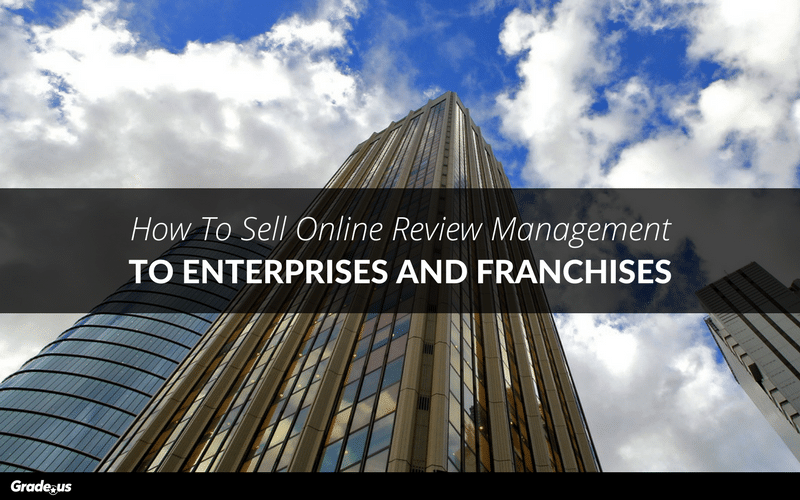It's a nightmare.
Selling review management to large enterprises and franchises is an unbelievably difficult ordeal when you don't know what you're doing. It's difficult even when you know what you're doing and the bad news is, it's only going to get worse.
Why?
Because the enterprise, franchises – they're always changing. It's a neverending cycle of change. These changes work against you constantly, making it difficult for you to achieve the result you want.
The enterprise, franchise - they're overwhelmed
The enterprise is expected to keep growing. Restructuring and reorganizing means their workforce is exhausted, overworked and completely stressed out. They're resistant to change, but change keeps coming.
The pressure to perform is constant.
Overworked decision makers are expected to stay on top of new technology and continually educate themselves about changes in the market. They're fighting to control their time, to minimize interruption, while they run from one crisis to another.
They're failing.
It's a constant battle for market share at their company as competitors and copycats fight them for control. Their customers are skeptical they can maintain a dominant position in the marketplace. Corporate buyers are expected to do more with less – less time and less resources.
The sales environment you'll have to work with...
Is a disaster.
The enterprise is under a daily barrage of marketing. Thousands of salespeople begging, clamoring for their time and attention. The enterprise is immune.
Decision makers continue to hide.
The combination of gatekeepers, technology and disagreeableness keeps unsophisticated sellers at bay. They're desperate for help and eager for support from the right professional. But that's always been rare.
The vast majority of salespeople are self-serving and needy.
They're not focused on the needs of the enterprise or franchise. They're focused on one thing and one thing only. Getting the biggest commission check they can. Many of these sellers, if given the chance, will beg, bully or manipulate their way into a sale. These sellers ruin it for the rest of us. Because of them it's harder to...
- Identify decision makers
- Get overworked decision makers to meet with you
- Differentiate your business (since many sellers are willing to lie to get what they want)
- Deliver overwhelming value to decision makers in client meetings
It sounds hopeless, impossible even. But it's absolutely doable with the right approach.
Franchises, the enterprise, they want the same things you do
They want you to deliver value, immediately and consistently. They don't want to be your friend, they expect you to know about their business and above all they don't want you to waste their time.
If you're looking to sell online review management to a large business you'll need to change your approach. Decision makers expect you to know their business inside and out. Their customers, competitors, desires, fears, frustrations, goals, industry. They expect you to know all of it, forwards and backwards, before you initiate contact.
That's the starting point.
It requires a significant amount of upfront work. Fail to do that and you destroy your credibility.
Just one problem.
You're not an insider. You don't work for these companies so you won't have the same amount of depth and detail they do.
That's okay.
The upfront research you do is your audition. It's a simple way for you to convey status, ability and competence. It shows decision makers you're invested, knowledgeable and willing to do the work. What else are they looking for?
Let's say you've earned a meeting.
Decision makers want to see (a.) Your focus is on making a difference, for them, the team for their department (b.) You're focused on creating tangible value and (c.) you have deep knowledge and expertise in your subject areas. Here's the thing though, you don't have a meeting. You don't even have an account entry plan.
Where do you start?
Step #1: Create a strong value proposition
Your Value Proposition consists of four specific ingredients.
1. Appeal: I want what you have to offer
2. Exclusivity: I can't get what you're offering anywhere else
3. Clarity: I understand what you're saying
4. Credibility: I believe you can/will do what you say
Most value propositions are weak. They focus on generic me too offers that are worthless to enterprise and franchise decision makers. Take a look at these two value propositions. Which one is more compelling?
· We offer a wide range of review management services for organizations in the financial, hospitality and restaurant space.
· We use reviews to dramatically boost hospitality conversion rates and revenue. One of our clients, XYZ Corp., increased occupancy rates by 60 percent and their online conversion rates by 36% in just six months. Our work added an extra $15,343,618 of profit to their bottom line.
Compelling value propositions rely on specificity, outcomes and tangible value. Decision makers are hungry for these kind of results. Tailor your value proposition to their specific circumstance and you have their immediate attention.
Step #2: Examine their business closely
The amount of time you spend researching the enterprise is directly proportional to the amount of value you'll receive from the enterprise or franchise you're pursuing. In other words, the bigger the contract the more research you'll need to do.
You'll need to know about your prospect's...
- Changes to their business
- Core business
- Competitors
- Financial motivators
- Industry trends
- Key performance indicators
- Priority projects
- Product/service lines
- Success metrics
You can use specialty research tools like SimilarWeb, Owler, BuiltWith to dig up information on performance and tech. You can use general tools like Google alerts, Google Finance, their websites, government filings, earnings calls and others. Create tripwires with the right information sources.
Step #3: Use triggering events
Tie online review management to their data.
Has your decision-maker recently launched a new product line? Show them how review management will keep their current launch on track. Are they in the middle of a crisis? Show them how to get customers to rally around their business and stabilize negative reviews.
Here's a caveat with triggering events.
You'll need to choose your prospects carefully. You simply won't be able to target hundreds or thousands of enterprise and franchise level prospects. You'll need to focus your attention on the prospects that matter most to you.
A list of 20 or so prospects should be plenty.
You should have a treasure trove of data on your target companies. Use triggering events to initiate a conversation with decision makers about the value you can provide with review management. Keep your message focused on them.
Initiate a conversation whenever there's a triggering event.
Use a variety of sales channels (e.g. email, phone, SMS, social media) to strike up a conversation. Make sure your message is clear, concise and credible.
Step #4: Cultivate weak connections
Weak ties are your acquaintances.
These are the acquaintances you rely on to make introductions, create connections and build relationships. This is how business is done. Weak ties are built on one thing.
Value.
Professional acquaintances, if they're good, give and receive value. It's the major component inexperienced salespeople miss. If you're looking to sell review management to enterprise and franchise decision makers, your job is simple.
Provide value.
Make it a habit to (a.) cultivate weak connections and (b.) provide value to each of your connections whenever you can. Use your accomplishments, skills/knowledge or strengths to serve your weak connections.
You can provide value in several ways.
· Knowledge. Your expertise is broad and your specialties are deep. You're able to use your knowledge in a variety of areas that are incredibly useful to enterprise and franchise decision makers.
· Connections. As a connector, you're able to introduce decision-makers to A-players. You're able to identify a problem and connect decision makers to a specific professional, product or service that can solve their problem.
· Abilities. You have a unique set of abilities and skill sets that allow you to accomplish more than those around you.
Providing consistent value to weak ties gives you the social capital you need to request favors. If you're looking to connect with decision makers, an introduction from the right acquaintance could make all the difference. Weak ties are helpful but not a requirement.
Take the time to cultivate them and it suddenly becomes much easier to meet with decision makers.
That's your goal.
Your research, planning and networking efforts should be focused on one specific thing.
Getting a meeting.
That meeting could be a phone, online or in-person meeting.
Step #5: meeting with enterprise and franchise decision makers
You've done it.
Your hard work has paid off. You've positioned yourself as an equal all thanks to all of your research and hard work. You have a meeting with your decision-maker. Your stressed out and overworked decision-maker. You'll need to advance the conversation.
What do you say?
Start by discussing business results.
Next, you ask questions.
Intelligent questions designed to open things up and initiate a conversation. You don't want to spend time chatting about yourself or your agency, but you don't want to badger decision makers with questions either.
You're looking to get a conversation going.
You can start with a simple question. "Can you give me an A to Z overview of your review management and marketing process?" The right question opens things right up. With the right question you'll find decision makers answer many of your questions before you've had a chance to ask.
That's good.
Your attention should be focused on listening and engaging with the conversation directly, not on taking notes.
Ask decision makers about their problems directly. You're there to help them so now is not the time to be bashful. Get them to agitate and quantify the problem if you can. For example...
- How have your online review challenges affected your conversion rate overall?
- What are the consequences for your organization if these issues aren’t addressed successfully?
- You mentioned a problem with discounts, do you feel this issue is connected to your review portfolio?
- Have these negative reviews impacted other areas of your business?
These questions may be painful but they're necessary. You'll need to have a frank conversation (as equals) about the problem if they hope to fix it.
And then what?
You ask them about the value of fixing the problem.
- What value would it provide to your organization if we solved these problems for you?
- If your negative reviews were reverse/buried and you saw a 15 percent increase in conversion, what would that be worth to your organization?
- Why’s it important that we fix this problem for you?
- Are there any other benefits to solving this problem for you?
Can you see what's happening?
The vast majority of sellers run their mouths. They can't seem to stop talking! Not you. By providing value, focusing on results and asking questions you've achieved something remarkable.
Your decision makers sold themselves!
If your decision maker is interested it's time to suggest next steps. That varies depending on the size of your company, your location and a variety of other factors. Your next steps could be:
- Meeting with product managers and customer support teams.
- A group meeting with franchisees.
- A pilot project to determine if there’s a fit.
- A test campaign to see what your team can do.
At this point it's reasonable for you to suggest next steps. Don't push for the big Yes if it's not time. Ask for the very next Micro Yes in the process. Continue to add value, to go above and beyond for decision makers.
Treat them as if they're already a client.
Overpromise, overdeliver and they may be your next enterprise or franchise client.
Your enterprise, franchise prospects are overwhelmed
Decision-makers are under constant pressure to perform. They're exhausted, overworked and completely stressed out. They're fighting to control their time, to minimize interruption, while they run from one crisis to another.
They're failing.
You can make a difference. With the right approach and lots of patience you can help decision-makers. The vast majority of salespeople are self-serving and needy. They're focused on their commission check, not on making a difference.
You can be different.
Show decision-makers you're focused on making a difference – for them, their team and their department. Create value, focus on outcomes. Make it all about your prospects and you'll find selling review management is a dream.
About the Author
Andrew McDermott
Andrew McDermott is the co-founder of HooktoWin. He shows entrepreneurs how to attract and win new customers.









